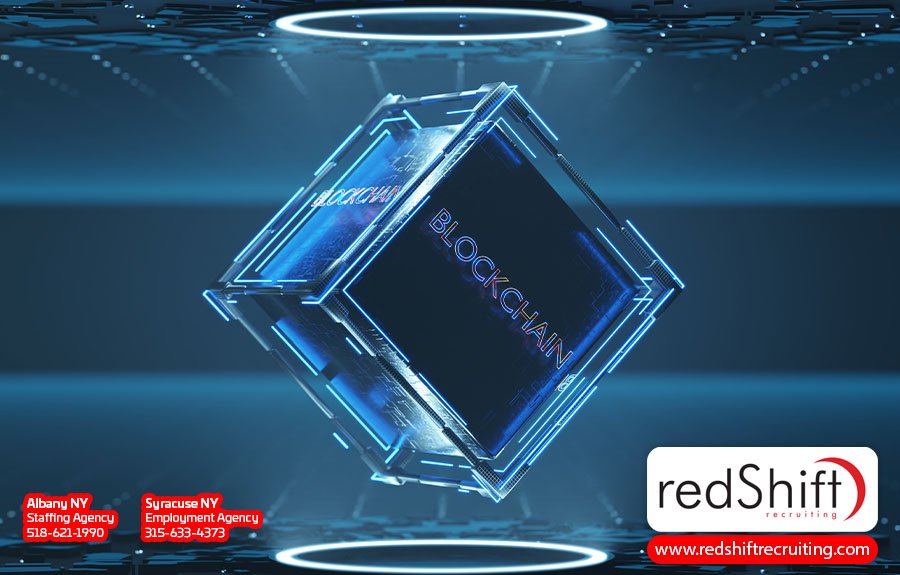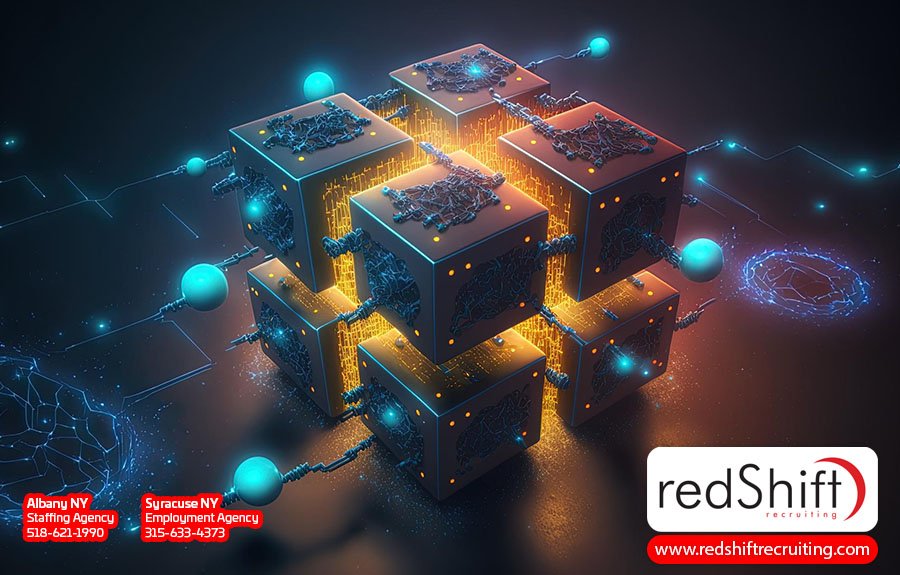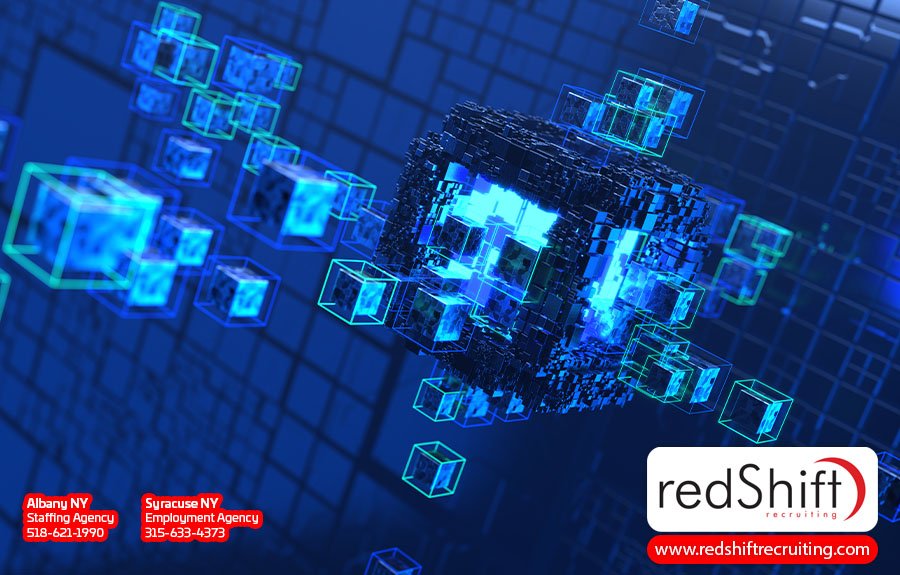Blockchain Development Careers: Building a Successful Future in Blockchain Technology
Blockchain has rapidly disrupted business models and transaction methods across a wide range of industries, from finance and healthcare to government and supply chain management. As companies seek to integrate this transformative technology, the demand for skilled blockchain developers is growing. For aspiring IT professionals, a career in blockchain development offers exciting opportunities to build groundbreaking systems and shape the digital future of industries.
In this article, we'll investigate the career path of a blockchain developer, exploring required technical skills, such as cryptography, data structures, and blockchain platforms, as well as soft skills and educational requirements. We'll also provide tips to help you gain hands-on experience, navigate career opportunities, and engage in professional development. Whether you're new to development or an experienced professional looking to specialize, a career in blockchain offers exciting opportunities, challenges, and rewards!
Understanding Blockchain Development
Blockchain technology is a decentralized digital ledger system where transactions such as financial trades, contracts, and asset transfers are securely recorded in linked blocks. Essentially, it is like a digital notebook where transactions are recorded on pages called “blocks.” Rather than being held by a single entity, the notebook is shared across numerous computers worldwide. Every block has a unique code known as a “hash.” These codes are crafted so that each depends on the one before it, forming a continuous "chain." This structure makes it very difficult to change past entries, as tampering with one disrupts the codes on all subsequent blocks. Given the vast number of individuals overseeing this shared digital notebook, unauthorized alterations are swiftly detected, ensuring both transparency and security.
Blockchain development is the process of designing, building, and implementing solutions and applications based on blockchain technology. It involves understanding the intricacies of this digital ledger system and creating tools or platforms that can utilize its unique features. Blockchain developers specialize in creating applications that harness this technology, from money transfers to supply chain tracking. They ensure that these applications run smoothly, securely, and transparently, while making the most of the decentralized nature of blockchains. Their expertise is central to expanding the versatile uses and potential of blockchain in various industries, from finance to healthcare.
Getting Started in Blockchain Development
Blockchain technology is rapidly gaining popularity due to its decentralized nature, enhanced security features, and transparency, resulting in a growing demand for skilled professionals in this field. For those pursuing a career in blockchain development, knowledge of the technology's underlying principles and practical experience are crucial. To effectively build and maintain blockchain applications, a blockchain developer must have strong technical skills, especially in cryptographic algorithms, distributed systems, consensus mechanisms, and programming languages like Solidity, JavaScript, and C++. A deep understanding of smart contracts, data structures like Merkle trees and Patricia trees, P2P networking, distributed databases, and backend development is also invaluable.
Beyond mastering the technical aspects of the role, aspiring professionals should hone soft skills such as critical thinking, adaptability, and effective communication skills. Excellent problem-solving and analytical abilities are also highly valuable for blockchain developers. The ability to think critically and identify potential vulnerabilities or improvements within the blockchain system is crucial for ensuring its security and efficiency.
Pursuing formal education in fields such as computer science or information technology can provide the solid foundational understanding required for a career in blockchain. Many universities and private institutions now offer specialized courses, degrees, or certifications in blockchain technology, catering to both beginners and experienced professionals. Aspiring blockchain professionals should consider enrolling in blockchain courses that cover topics such as smart contracts, decentralized applications (DApps), and distributed ledger technology.
Hands-on experience is invaluable for those looking to get started in blockchain development careers, and experienced professionals looking to change career paths can often build on their existing expertise and adapt it to the blockchain domain. For example, a software engineer transitioning into blockchain development can leverage their existing programming skills to become a blockchain engineer. By familiarizing themselves with languages like Solidity and tools like Ethereum, they can quickly adapt to the unique requirements of blockchain development. Database administrators can apply their knowledge of data structures and distributed systems to become blockchain database specialists, while a quality assurance engineer with a background in testing and validating software can transition into the role of a blockchain quality engineer, ensuring that blockchain applications function correctly and meet performance standards. Other career opportunities for those looking to transition into blockchain include blockchain project managers, who oversee the successful execution and implementation of blockchain initiatives; blockchain architects, who design the structural framework of blockchain systems; and blockchain security specialists, who focus on ensuring the safety and integrity of blockchain systems and transactions.
Being actively involved in the blockchain community can open doors to mentorship, partnerships, and job opportunities. Attending conferences and webinars, participating in forums or workshops, or joining blockchain-related groups can foster valuable connections and provide insights into the industry's direction. This will also help blockchain professionals stay up-to-date on industry trends, tools, and developments, which is vital to remaining relevant and effective in this rapidly changing field.
Specializing in Blockchain Development
Specializing in blockchain development offers a range of potential benefits. As more industries adopt blockchain technology, the demand for highly skilled blockchain developers continues to rise, creating numerous job opportunities as well as competitive earning potential. By working in this emerging field, you’ll have the opportunity to be at the forefront of technological advancements and shape the future of decentralized solutions and digital trust. The skills gained through specialized training in blockchain development are applicable across a myriad of industries, allowing you to explore diverse roles and work on groundbreaking blockchain projects. Blockchain also presents an avenue to drive ethical and transparent practices in various sectors, from finance and healthcare to supply chain management and real estate. Finally, you’ll belong to a vibrant community of passionate blockchain professionals, providing opportunities for professional growth and development, networking, and collaboration.
While blockchain development careers offer many exciting prospects, there are also potential challenges to consider. For instance, decentralized application (DApp) development can differ significantly from traditional software development and requires an understanding of specific platforms like Ethereum or Hyperledger. These platforms, along with others, each offer specific frameworks, tools, and nuances that developers must grasp. Furthermore, as blockchain continues to find its footing worldwide, understanding the associated regulatory and compliance aspects becomes imperative since many countries are still developing policies and guidelines around this technology.
Industry-specific use cases add another layer of complexity. For example, applying blockchain in finance might involve creating secure digital wallets or platforms for instantaneous cross-border transactions, while in healthcare, it could mean developing systems for transparent and tamper-proof patient records. Moreover, the rapidly evolving nature of blockchain technology means that continuous learning and adaptability are essential. Staying updated with the latest industry trends, regulatory changes, and technological advancements is crucial. To thrive, aspiring blockchain developers should be prepared for a dynamic and fast-paced work environment, requiring both deep technical expertise and a broader understanding of various industries' unique needs and challenges.
Gaining Practical Experience
Hands-on experience is invaluable for those interested in a career in blockchain development. Many organizations and startups are at the forefront of this cutting-edge technology, leveraging the potential of blockchain to streamline financial transactions, establish more transparent supply chains, or create decentralized applications.
For those looking to gain practical experience in this dynamic field, freelance opportunities offer a great start, allowing you to apply your skills to real-world projects and build a strong portfolio, from creating simple smart contracts to developing complex decentralized systems. Participating in open-source initiatives related to blockchain can also significantly enhance your technical proficiency and understanding while providing feedback from seasoned professionals, fostering community involvement, and building your professional reputation.
Blockchain hackathons and competitions are another unique way to gain hands-on experience in this field. These activities encourage participants to solve challenging real-world problems using blockchain-based solutions, often under tight time constraints. They’re an excellent way to innovate, network with industry leaders, and even potentially land job offers from companies impressed with your skills. Additionally, platforms like Polygon, Avalanche, Solana, and Offchain Labs' Arbitrum provide innovative tools and environments for developers to experiment with and deploy scalable blockchain applications. Leveraging these platforms can fast-track your expertise and build your blockchain skills.
Cities like San Francisco, New York City, Chicago, and Austin, TX, have become hotspots for blockchain development careers due to the concentration of tech companies and startups embracing this technology. However, the rise of remote work opportunities in the tech sector also allows aspiring blockchain professionals to collaborate with global teams, gaining diverse insights and significantly expanding their professional network. Ultimately, whether it's refining the algorithms behind secure peer-to-peer transactions or brainstorming the next big innovation in decentralized applications, the dynamic world of blockchain offers numerous avenues for growth and hands-on learning.
Navigating the Job Market
Blockchain developers are the backbone of the industry, crafting the code that brings decentralized applications to life. The blockchain job market is diverse, with opportunities spanning from highly technical roles to managerial and consulting positions. Understanding the nuances of each position can guide aspiring professionals towards a fulfilling career path tailored to their skills and interests.
Within the blockchain industry, smart contract developers play a specialized role, writing self-executing contracts that are pivotal for automating and ensuring the execution of agreement terms on platforms like Ethereum. A strong technical foundation is vital in these roles, as developers design, build, and maintain secure and efficient smart contracts and other blockchain functionalities.
For those with a penchant for design and system planning, the job of blockchain architects offers a chance to conceptualize and structure sophisticated blockchain networks. This position allows IT professionals to immerse themselves in the intricacies of distributed computing and mechanism design, laying the blueprint for scalable and secure decentralized systems. On the other side of the spectrum, blockchain quality engineers are indispensable assets in the development cycle of blockchain applications, ensuring these applications not only function as intended but also meet rigorous performance and security standards. By delving into this role, you can sharpen your analytical skills, identify vulnerabilities, and optimize blockchain solutions, ensuring that they are both robust and efficient.
IT specialists inclined towards management and strategy may thrive in the role of a blockchain project manager. These professionals are the linchpins who oversee the implementation of blockchain solutions across varied platforms, ensuring projects stay on track, meet their objectives, and effectively tackle any challenges that arise. Meanwhile, the intersection of law and blockchain technology has carved out a niche for blockchain legal consultants. A blockchain legal consultant provides essential legal advice, navigates compliance challenges, and liaises between tech teams and legal authorities, ensuring that innovations in the blockchain space progress within the bounds of the law. With the regulatory landscape of blockchain evolving rapidly, these experts ensure that projects adhere to the latest regulations.
For IT professionals, the blockchain job market offers a mosaic of roles, each with its own unique challenges and rewards. Whether you're technically inclined, have managerial prowess, or possess expertise in regulatory nuances, there's a place for you in this burgeoning industry. Navigating the job market can be challenging, but with the right skills and networking connections, you can find opportunities in the fast-growing field of blockchain.
Continuing Education and Professional Growth
Continuing education and professional growth are essential for staying relevant in the tech industry. As a blockchain developer, it's crucial to continuously update your technical skills and knowledge to keep up with the latest advancements in blockchain technology. By investing in your own professional development, you not only enhance your value as a developer but also increase your chances of building a successful future in this field.
There are various ways to pursue continuing education in blockchain development. You can enroll in advanced online courses that focus on specific aspects of blockchain technology, such as smart contracts or decentralized applications. Workshops and certifications offered by reputable organizations can also provide valuable insights into the latest trends and best practices.
Engaging in real-world projects and collaborating with other developers within the industry can further expand your skillset and professional network. By actively participating in open-source projects or joining developer communities, you can gain practical experience and stay knowledgeable about the latest developments.
Ultimately, embracing continuous learning is not just a recommendation but a necessity for those aiming to excel in this dynamic field. While formal education lays the foundation, it's the ongoing efforts in self-education, collaboration, and hands-on work that enable a blockchain professional to thrive.
Frequently Asked Questions
What Are the Potential Risks and Challenges of Blockchain Development?
Some potential risks and challenges in blockchain development include security vulnerabilities, regulatory uncertainty, and scalability issues. A blockchain developer must be able to navigate the evolving landscape of cybersecurity threats and ensure the integrity of the blockchain. As blockchain technology grows, scalability also becomes a challenge due to increased transaction volume. Additionally, the lack of clear regulations can create legal uncertainties that may impact their work. To overcome these obstacles, it is crucial to stay informed, adapt to changes swiftly, and continuously enhance your skills.
How Can I Stay Updated With the Latest Trends in Blockchain Technology?
To stay updated with the latest advancements and trends, actively engage with the blockchain community. This may include joining online forums, following industry experts on social media platforms, and attending conferences and meetups related to blockchain development. Additionally, regularly read reputable publications and blogs that cover blockchain news and developments. Continuous learning and networking will help you stay at the forefront of this field.
What Technical Skills Are Highly Sought After in the Blockchain Industry?
For those who want to gain a competitive edge, it's crucial to stay up-to-date on new technology and trends. Mastering programming languages like Solidity, C++, Java, Rust, Go, and Python is advantageous, along with developing a strong understanding of distributed systems, cryptography, and smart contracts. Other technical skills in high demand include knowledge of peer-to-peer (P2P) networks, experience with various blockchain platforms such as Ethereum and Hyperledger, and proficiency in implementing consensus algorithms.
What Are Some Common Misconceptions About Blockchain Development?
Some common misconceptions about blockchain development include the idea that all blockchains are public and transparent, while in reality, there are private and permissioned blockchains that offer varying degrees of privacy. Additionally, many believe that blockchains are unchangeable and can't be altered, but under certain conditions, historical data can be changed through consensus in some blockchain systems.
Another misconception is that blockchain is only for cryptocurrencies or that it's too complex to learn. However, blockchain technology has a wide range of applications beyond just digital currencies, such as supply chain management and healthcare records. While it may seem intimidating at first, with the right resources and determination, anyone can learn the necessary skills to become a successful blockchain developer.
How Can I Showcase My Blockchain Development Skills to Potential Employers?
To effectively showcase your blockchain development skills and experience to potential employers, you must strategically highlight your expertise. Emphasize your technical proficiency in blockchain frameworks like Ethereum or Hyperledger. Demonstrate your ability to design and implement smart contracts, as well as develop decentralized applications (dApps). Showcase any relevant projects you have worked on, highlighting their impact and success. Additionally, obtaining certifications or participating in hackathons can further validate your knowledge and attract the attention of potential employers.
Conclusion
Blockchain has rapidly transformed from an experimental technology to an indispensable innovation across a wide range of industries. As demand for blockchain solutions accelerates, developers with specialized expertise are perfectly positioned for impactful careers in this growing field. By understanding blockchain fundamentals, honing technical skills, gaining hands-on experience, and pursuing continuing education, aspiring blockchain developers can excel and thrive in this career path. Whether you're new to coding or a seasoned developer, if you aspire to push boundaries and drive technological innovation, blockchain development offers exciting possibilities.
Article Author:
Ashley Meyer
Digital Marketing Strategist
Albany, NY






